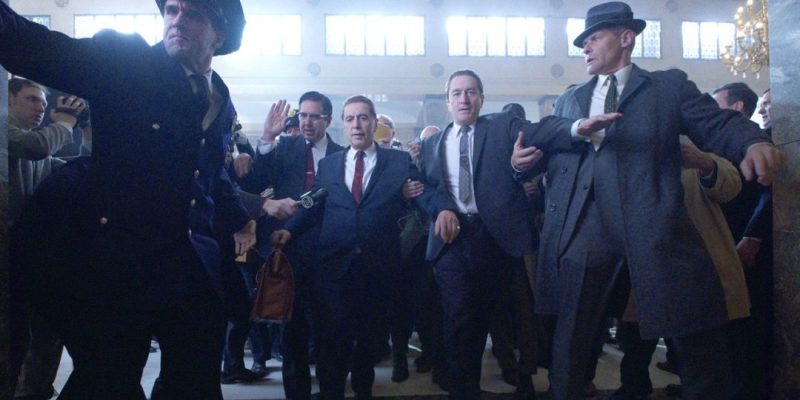There is something slightly different about this year’s awards season, and it’s largely the result of having a tech disruptor, Netflix, in the running.
Awards season is generally a rather considered affair, about honoring the very best that exists in cinema. This normally involves a great deal of seriousness and gravitas on the part of the bodies conferring the honors and the films receiving them (the Golden Globes — with its famous and beloved open bar — is perhaps the exception).
Every year, there are debates about how the Academy is “losing touch” with the cinematic tastes of the contemporary movie-going public. The viewership for the ceremony roughly correlates with the box office yield of the Best Picture contenders, with both yield and viewership having dropped in the 21st century. It is easy to overstate the extent of the issue, but there is some truth to it.
This makes the intrusion of Netflix into the arena interesting. Netflix has traditionally been ambivalent about industry rules. The company decided to stop screening its films at the Cannes Film Festival rather than adhere to France’s 36-month gap between theatrical and home media release. Even today, they are cagey about releasing box office results and viewer figures.
Of course, Netflix really wants an Oscar. There are multiple reasons for this. Netflix obviously wants the prestige of the highest honor in cinema, but they also see it as an opportunity to court talent that may boost subscriptions. Last year, Netflix played by the awards season rules, perhaps expecting that they would be rewarded for good behavior.
Like most other studios, Netflix threw its weight behind a single film; they backed Roma, a black-and-white pseudo-autobiographical Spanish and Mixtec period piece from Alfonso Cuarón. They courted voters in the traditional way, with a reportedly bottomless budget for gifts and promotional materials. This was enough to secure a Best Picture nomination for Roma, but not a win.

In the year that followed, there was a sense of increased tension between Netflix and the traditional studios. Steven Spielberg argued that Netflix produced television movies rather than cinema and so should be ineligible for the awards. There were even discussions of rule changes within the Academy to exclude streaming services, although these were ultimately shut down.
As this year’s awards season rolled around, Netflix opted to play by its own rules. Most notably, the studio fell back on its depth of content and commissioned an incredibly daunting array of semi-credible awards contenders: The Irishman, Marriage Story, Uncut Gems, The Two Popes. Inevitably, some of the films (like The King) got lost in the shuffle.
It has been striking to watch awards season filtered through the Netflix publicity engine. Netflix has always been an extraordinarily savvy company at managing its brand. It was one of the earliest companies to ensure that its social media platform had a suitably distinctive personality. As befitting an online streaming service, Netflix is extremely online — and extremely tailored for the digital age.
Films like The Irishman and Marriage Story are fairly conventional awards fare, from respected directors and with prestigious casts. However, Netflix has found a way to take these very conventional awards season films and render them accessible to a much wider and more diverse audience than would normally enthusiastically engage with these sorts of films.
The most obvious factor is accessibility. It’s often difficult for mainstream audiences outside the coast to see these awards season films. Many of the smaller films like Call Me By Your Name or Lady Bird find their releases staggered. These films play smaller arthouse theaters while multiplexes are crowded out by blockbusters — with distributors occasionally contributing to the problem.
In contrast, while Netflix has agreed to an exclusive theatrical window for films like The Irishman and Marriage Story, they are instantly available to the company’s 158.3 million subscribers as soon as they hit the service. Netflix has suggested that 26.4 million people worldwide watched The Irishman on its first week on the service, with Nielsen independently suggesting 17.1 million American viewers.

While Oscar contenders like JoJo Rabbit and Dark Waters struggle to accrue thousands of ratings on IMDb, The Irishman has over one hundred thousand — figures closer to blockbusters like Joker or Star Wars: The Rise of Skywalker. These films have proven popular with online audiences. The Irishman and Marriage Story made the IMDb’s Top 250 Movies of All-Time within days of their release.
Martin Scorsese has been quite candidly anxious about The Irishman existing on a streaming service. He has asked fans not to watch it on a phone and not to break it up over multiple sittings. However, the internet has embraced The Irishman and made the film its own, offering advice for turning it into a miniseries or the simple delights of Al Pacino saying “cocksucker” for 38 seconds straight.
Meanwhile, Marriage Story generated its own endearing meme format, which could then be applied to anything from Adam Driver’s other big role this December through to debate over the movie itself. Marriage Story trended on social media. On release day, Noah Baumbach’s semi-autobiographical divorce dramedy seemed to hold as much of the internet’s attention as Baby Yoda.
Netflix itself has eagerly encouraged this memefication. On the day of release, social media users were provided a library of GIFs ready for use in online conversation, cropped and captioned. There is an Irishman or Marriage Story GIF for every occasion: Al Pacino dancing, Robert DeNiro nodding, Joe Pesci shrugging, Adam Driver’s hair being rustled, Scarlett Johansson dancing.
There are always Best Picture contenders that will garner a strong online following. However, these films are typically those that seem designed to resonate with younger and tech-literate audiences, like Greta Gerwig’s Lady Bird or Jordan Peele’s Get Out. In contrast, The Irishman might be described as a “dad movie” with an average audience of 49 years old, 18 years above the Netflix average.

Netflix’s wide distribution platform and social media savvy have allowed more conventionally prestigious awards fare to resonate with larger and more enthusiastic audiences. There is a debate to be had about how these films would have performed in a more conventional release model, but it is hard to believe that they would have permeated popular consciousness to the same degree.
There are understandably reasons to be anxious about this shift. As with the intervention of billionaires like Megan Ellison into the market, it is fair to ask whether this model is sustainable in the long term. More traditional voices might worry that the memefication of films like The Irishman or Marriage Story might diminish them in some way, reducing their complexities to punchlines.
However, at a time when Hollywood is worried about the state of the marketplace and the future of cinema — and particularly about the relevance of the annual awards fare — it is heartening to see that these films still have broad appeal and there is a hungry audience waiting for them. Through these memes, GIFs, and viral clips, Netflix’s model reminds us that these films are for everyone.
When films like The Irishman struggle to get made outside of Netflix, there is something reassuring in the internet’s warm embrace.
